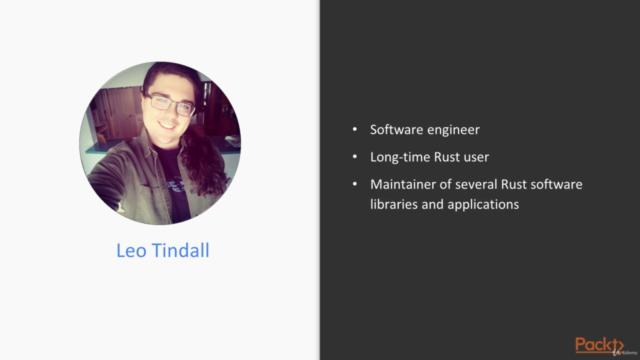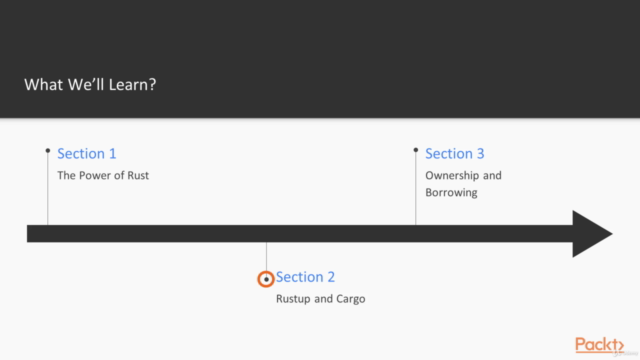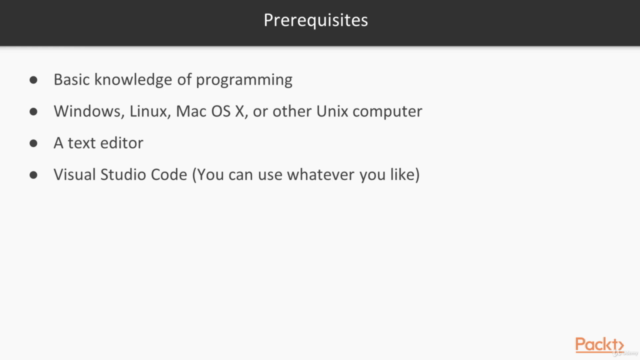Rust: Building Reusable Code with Rust from Scratch

Why take this course?
🚀 Rust: Building Reusable Code with Rust from Scratch 🚀
Dive into the world of Rust, a modern systems programming language that emphasizes safety, speed, and concurrency without sacrificing performance. This comprehensive course is designed for developers who are eager to learn how to write clean, reusable Rust libraries that are easy to understand and maintain.
Why Learn Rust? 🌟
- Safety: Catch memory safety issues at compile time.
- Concurrency: Write concurrent code without data races.
- Performance: Experience near-native performance for systems programming.
- Modern Tooling: Utilize Cargo for dependency management and RustDoc for documentation.
Course Highlights:
- 🧵 Start from Scratch: Gain a solid understanding of Rust's basic syntax, control flow, and error handling.
- 🛠️ Building with Cargo: Learn how to manage Rust toolchains and build command-line applications.
- 🔍 Exploring Types: Explore Rust's powerful type system and apply it in a markup language parsing project.
- 🧮 Functional Features: Discover Rust's functional programming capabilities, including higher-order functions and closures.
- 📚 Physics Simulation: Perform a physics simulation using Rust and the Rayon crate for parallelization.
- 🏗️ Best Practices: Implement best practices to write clean, reusable Rust code and build a simple crate with a well-documented API.
- 🔄 Code Reuse: Master advanced features such as traits, generics, and macros to create adaptable, reusable code.
- 🌍 Publishing Crates: Organize your code into modules and crates for publication on crates.io.
What You'll Learn:
- Rust Basics: Syntax, memory safety features, and building your first "Hello, World!" program.
- Functional Programming in Rust: Utilizing higher-order functions, closures, and parallel computing with Rayon.
- Type System Mastery: Understanding structs, enums, and Rust's strong typing to write more expressive and bug-resistant code.
- Effective Error Handling: Learning Rust's approach to error handling and how to make your code robust in the face of unexpected input.
- Testing & Documentation: Writing unit tests with assertions, property tests for edge cases, and creating clear documentation with RustDoc.
- Code Reuse Strategies: Using traits and generics to write functions that can work on any data type, and macros for code abstraction.
- Building a Reusable Library: Creating a reusable crate from scratch, complete with a tested and user-friendly API.
- Code Organization: Structuring your Rust projects effectively using modules, crates, and Cargo's package management system.
By completing this course, you'll be well-equipped to write reusable Rust code, publish your libraries for others to use, and contribute to the thriving Rust ecosystem. Whether you're a beginner or an experienced programmer looking to expand your skill set, this course will provide you with the knowledge and tools necessary to excel in Rust programming.
Join us on this journey to master Rust and unlock the potential of safe, concurrent, and high-performance systems programming! 🤝
Course Gallery




Loading charts...
Comidoc Review
Our Verdict
This dual-course Rust adventure features a mix of hands-on exercises and theory to convey beginner and advanced concepts alike. With two courses in one, it's an economical pick for the budding Rustacean that won't break the bank. However, uneven presentation quality and minor errors detract from an otherwise engaging and informative experience. Some learners might prefer a more polished and streamlined course with more advanced content. Recommended for developers familiar with programming concepts who wish to expand their knowledge of Rust without fully committing to a comprehensive study.
What We Liked
- Two courses for the price of one, covering beginner Rust concepts and advanced topics like generics, traits, and macros
- Uses a mix of hands-on exercises and theory to explain complex concepts
- Explains and demonstrates how to use crates.io in Rust projects
- First section utilizes an online playground IDE for easy accessibility
Potential Drawbacks
- Confusing structuring, with multiple instructors and minimal communication between sections
- Several bugs found in example code during courses
- Minor inaccuracies and some under-explained concepts throughout the course
- Lack of advanced materials may impact learners wanting a more comprehensive understanding